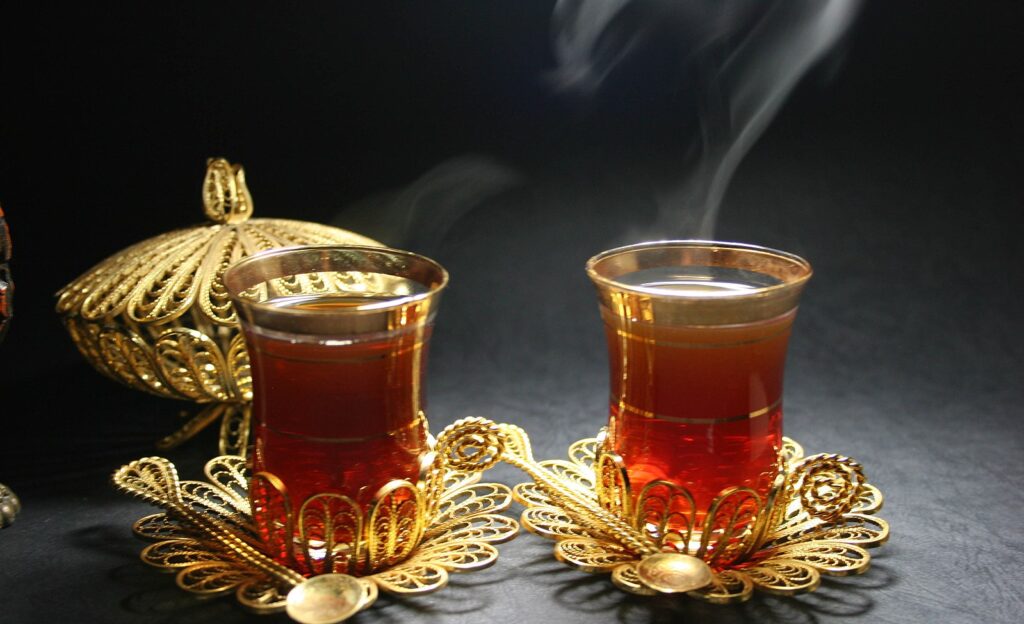Yemeni Tea: The Jewel Of Aden Yemen

By: Anthony Bayyouk / Arab America Contributing Writer
Tea in the Arab World varies from country to country and village to village. Green tea with spices and herbs is common at formal and informal gatherings. Tea is consumed in the morning for breakfast, after dinner, and any time of the day. Many people love to share long conversations over a cup of tea. Growing up, I remember we would have tea after dinner at every family gathering. At breakfast, even as little kids, we loved tea. There are many different ways of making tea. Some people like adding the mint leaves before the water boils, and others add them after the water boils. The different ways of making tea have been related to different regions. For example, Syria, Lebanon, and Palestine add mint leaves to their tea because mint plants are abundant in those countries. Right now, Yemeni tea has become very popular in the United States. Yemeni cafes are popping up all over the place.
Shai Adeni, which is tea from the city of Aden in Yemen, has become very popular among many Arabs. It is a black tea made with cinnamon, cardamom, cloves, and sweetened condensed milk or evaporated milk with some sugar. The ingredient that makes it stand out from all other teas is condensed milk. Yemeni coffee shops go through hundreds of condensed milk cans a day. The sweet Shai Adeni is often had after dinner because it satisfies the sweet tooth. Aden, Yemen, where the tea originates from, is filled with coffee shops. Tea shops outnumber restaurants in Aden. Aden overlooks the southwest coast of the Arabian peninsula. The hundreds of coffee shops fill Aden with the aroma of sweet tea. It is more than just native to Aden. It is what Aden is all about. Everyone in the Middle East and Arabs around the world knows Aden has always served the best tea for centuries. Society, social class, and agriculture have all contributed to the recipes of Shai Aden that exist today.
Tea arrived in Aden in the 1800s by the Indians. Milk is added to tea to boil over low heat. Mixed spices are added, including walnut, cardamom, and a little ginger, for those who want to take their tea in the Indian style. There are two popular ways to prepare the tea: the old way on coals, or a gas oven as is prevalent in modern times.” There are two critical components to making tea. The way it’s boiled, and the second is the freshness of the tea leaves. The condensed milk must be added while the tea is heating up. The tea will boil over if it is added too late or left for too long on the heat. The freshness of the leaves gives it that authentic flavor.
With the recent influx of Yemeni immigrants to the United States. More and more Yemeni-inspired restaurants and cafes are popping up around the United States, especially in Michigan. Cafes such as Qahwah House are known among the youth as Yemen Cafe. Qahwah House opened two locations in Michigan in just a few years. All the youth and adults also love to catch up with family and friends at the Yemeni cafe. It is a trendy hang-out spot after Friday prayer. The authentic cafe has walls covered in paintings of Yemen. Everything makes you feel like you’re living in Yemen, from the decor to the glass cups used to serve the tea. There is also Qamaria house that also has multiple locations in Michigan. Qamaria House has locations in Commerce, Michigan, where there are not very many Yemenis or Arabs in general. Yet, their amazing tea and culture are loved by the community.
Many Yemeni tea recipes are online, and the ingredients can easily be found in any grocery store or Amazon. Next time you need a place to catch up with friends, try finding a nearby Yemeni cafe.
Check out Arab America Blog here!









